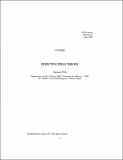Por favor, use este identificador para citar o enlazar a este item:
http://hdl.handle.net/10261/33231COMPARTIR / EXPORTAR:
 SHARE
BASE SHARE
BASE
|
|
| Visualizar otros formatos: MARC | Dublin Core | RDF | ORE | MODS | METS | DIDL | DATACITE | |

| Título: | Effective Field Theory |
Autor: | Pich, Antonio CSIC ORCID | Fecha de publicación: | jun-1998 | Editor: | Elsevier | Citación: | arXiv:hep-ph/9806303v1 | Resumen: | These lectures provide an introduction to the basic ideas and methods of Effective Field Theory, and a description of a few interesting phenomenological applications in particle physics. The main conceptual foundations are discussed in sections 2 and 3, which cover the momentum expansion and the most important issues associated with the renormalization process. Section 4 presents an overview of Chiral Perturbation Theory, the low-energy realization of Quantum Chromodynamics in the light quark sector. The Chiral Perturbation Theory framework is applied to weak transitions in section 5, where the physics of non-leptonic kaon decays is analyzed. The so-called Heavy Quark Effective Theory is briefly discussed in section 6. The electroweak chiral Effective Field Theory is described in section 7, which contains a brief overview of the effective Lagrangian associated with the spontaneous electroweak symmetry breaking. Some summarizing comments are finally given in section 8. | Descripción: | 106 páginas, 21 figuras, 5 tablas.-- Trabajo presentado en el Les Houches Summer School "Probing the Standard Model of Particle Interactions" (1997). | Versión del editor: | http://arxiv.org/abs/hep-ph/9806303 | URI: | http://hdl.handle.net/10261/33231 |
| Aparece en las colecciones: | (IFIC) Artículos |
Ficheros en este ítem:
| Fichero | Descripción | Tamaño | Formato | |
|---|---|---|---|---|
| 9806303v1.pdf | 810,22 kB | Adobe PDF |  Visualizar/Abrir |
CORE Recommender
Page view(s)
495
checked on 04-may-2024
Download(s)
226
checked on 04-may-2024
Google ScholarTM
Check
NOTA: Los ítems de Digital.CSIC están protegidos por copyright, con todos los derechos reservados, a menos que se indique lo contrario.
